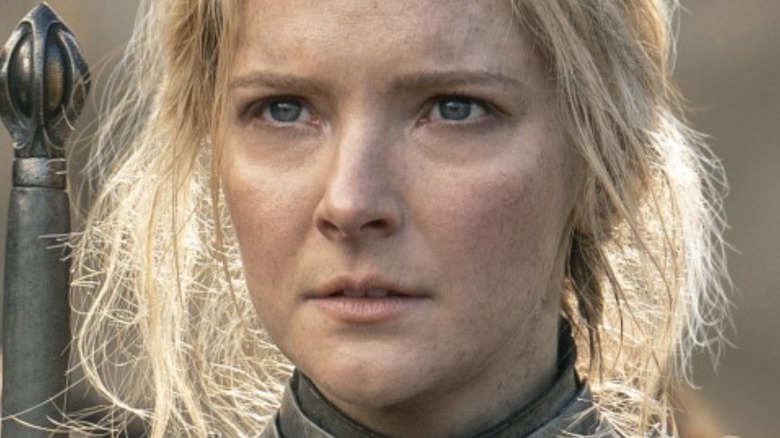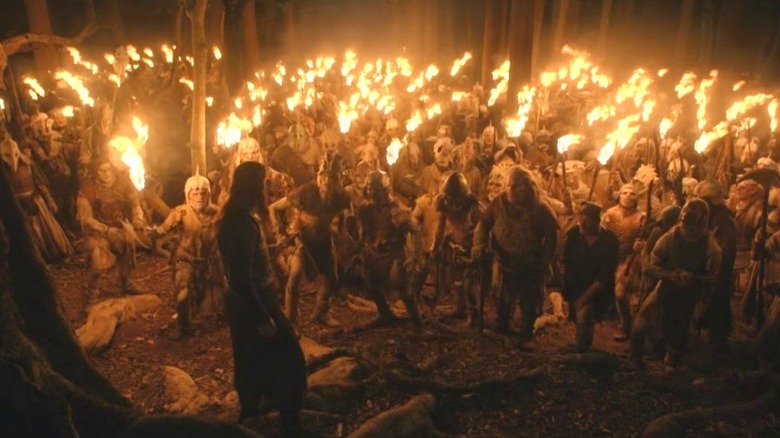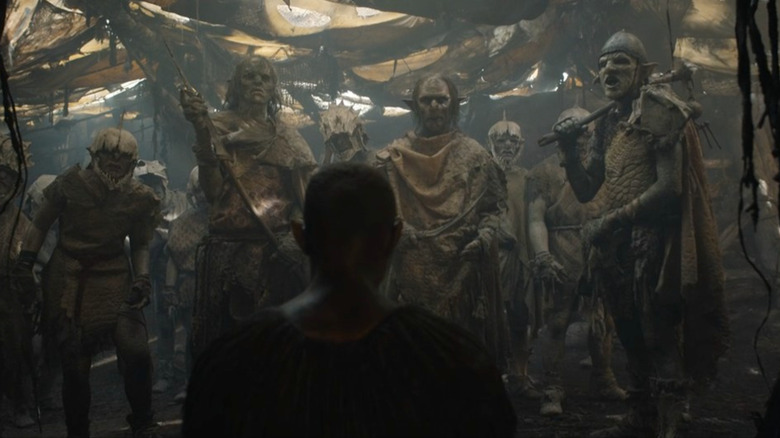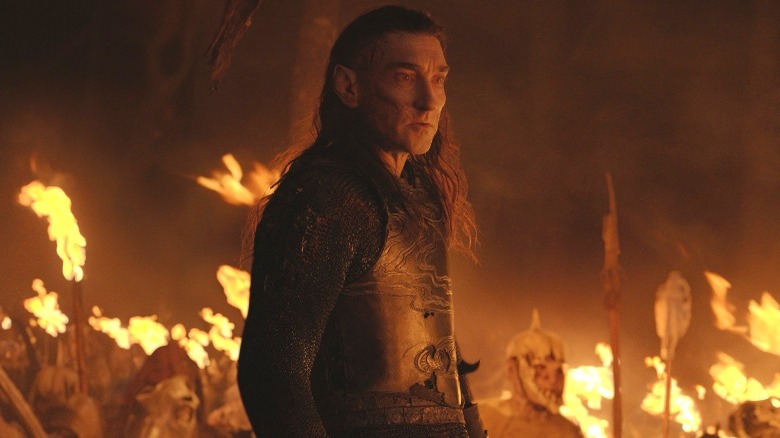Does Anything In Tolkien's Writings Explain The Rings Of Power's Adar?
Contains spoilers for "The Rings of Power" Season 1, Episode 6
There's no question who the villain in "The Lord of the Rings" is. ... It's Sauron, guys. You know, the big fiery eyeball up on top of the tower in Peter Jackson's films? Yeah, that guy. Of course, Sauron is an immortal spirit, and his life begins much earlier than that. In fact, he's puttering around Arda from the beginning of time. He starts out as a good guy, but eventually, he's convinced to join the original Dark Lord Morgoth and becomes his second in command. Then in the Second Age after Morgoth is defeated (and when Amazon Prime's "The Rings of Power" takes place), Sauron steps into his master's shoes, becoming the top dog and the central villain from that point in the story forward.
While "The Rings of Power" has made it clear that Sauron is going to be the primary antagonist in the show, though, throughout the bulk of Season 1, the Enemy is only mentioned in dialogue and exposition. Sure, he's clearly lurking on the edge of the story, and maybe he's even secretly masquerading as someone else. But as far as open, named characters go, he's persona non grata, folks. He's nowhere to be seen.
This has left a bad guy vacuum for the Season 1 story arc — a void that has been filled by the show's newly minted character Adar. His name means "father" in Sindarin, and he is the stand-in parent for the Orcs that he leads. As the show has progressed, he's shown a fascinating mixture of strength and poise, violence and compassion, care and coldheartedness. But where did the idea for someone like Adar come from? Is there a basis for the character in Tolkien's legendarium?
The Orcs have petty lords in Tolkien's writings
Seeing someone other than Sauron leading Orcs is a bit disconcerting. Who is this upstart who claims he led his own Orcs to help Sauron, killed the guy, and then marched off to find his followers a homeland? The entire thing sounds off-brand for a world where uniform obedience to the Dark Lord is the general order of business. The truth is, though, there are actually quite a few examples of Adar-like leaders who technically follow Sauron but are also ready to stick a knife in his ribs if they get the chance.
For instance, Shelob is infamous as an independent villain. She marches to the beat of her own drum and only cooperates with Sauron when she feels like it. Saruman is another good example. On paper, he's subservient to Sauron, but the double traitor is actively trying to obtain the One Ring and usurp his master during "The Lord of the Rings." Other powerful villains, like Smaug and the Balrog in Moria, appear to operate on their own as well.
Even among Sauron's own devoted followers, there are free spirits. We're used to the Nazgûl who blindly follow orders, but remember, they're subjugated individuals who are controlled by their master through the Rings of Power that they wear. But Sauron's Orcs? They're anything but loyal. Sure, they obey out of fear, but they're always looking for ways to resist and rebel. Two of their captains even famously have a chat at the end of the "Two Towers" book where they talk about going off on their own and setting up shop with some trusty followers where there are "no big bosses" after the War of the Ring.
Independent Orc communities in Middle-earth
Of course, all of these examples are from the Third Age, when "The Lord of the Rings" takes place. "The Rings of Power" is set thousands of years before this time. So what's the state of affairs in the wake of Morgoth's fall as Sauron is just starting to rise to power for the first time?
The book "Morgoth's Ring" gives us a little bit of an idea in a chapter called "Myths Transformed," which breaks down Tolkien's incomplete backstory of the Orcs. While it says that Orcs were dominated by the will of supernatural masters like Morgoth, it also states that when the attention of their master was elsewhere, "they relapsed into independence and became conscious of their hatred of him and his tyranny."
At another point, it specifically addresses the question of what happens to the Orcs after Morgoth falls and before Sauron completely takes over, including the different Orc cultures that develop and how the groups feud with one another. It also adds the enlightening line "in many places in Middle-earth, after the fall of [Morgoth] and during the concealment of Sauron, the Orcs recovering from their helplessness had set up petty realms of their own and had become accustomed to independence." So before Sauron shows up to actively unite all the Orcs against their common enemies, they are divided into independent, autonomous groups, some of which doubtless had leaders like Adar who focused on guiding them to greener pastures in their own rough and tumble way.
Is Adar an Orc?
The idea of a petty lord leading an independent group of Orcs is definitely present in Tolkien's writings. But what about the claim that Adar is an Orc — er, sorry, an Uruk? While the origin of the race of Orcs is anything but clear, there's one version of their genesis that jives very much so with what Galadriel says when she interrogates Adar in Episode 6: "When I was a child, I heard stories of Elves taken by Morgoth. Tortured, twisted, made into a new and ruined form of life. You are one of them, are you not? The Moriandor. The sons of the dark. The first Orcs."
This comes straight from the official Orc origin story as published in "The Silmarillion," which talks about Elves that Morgoth captures, pointing out that their fate isn't certain: "All those of the Quendi who came into the hands of Melkor, ere Utumno was broken, were put there in prison, and by slow arts of cruelty were corrupted and enslaved; and thus did Melkor breed the hideous race of the Orcs in envy and mockery of the Elves, of whom they were afterwards the bitterest foes."
This is introduced after a reference to "the most ancient songs of the Elves, of which echoes are remembered still in the West" — a connection that echoes Galadriel's claim to have heard these stories when she was a child ... in the West. Adar may be new on the scene, but his role as a twisted Elf and petty lord is very much in line with the Second Age of Middle-earth.



